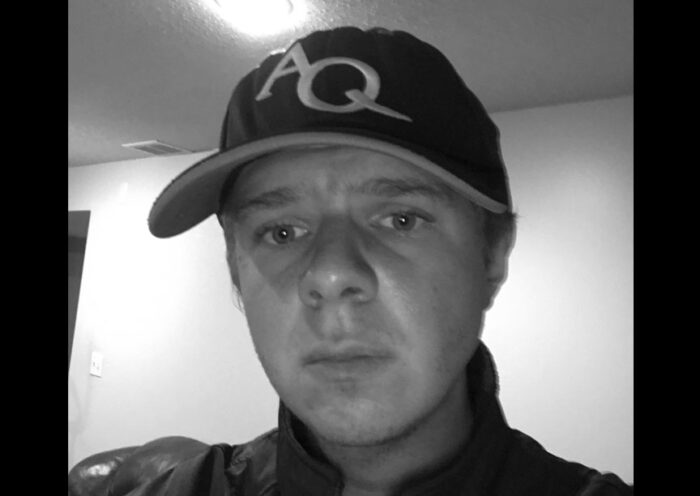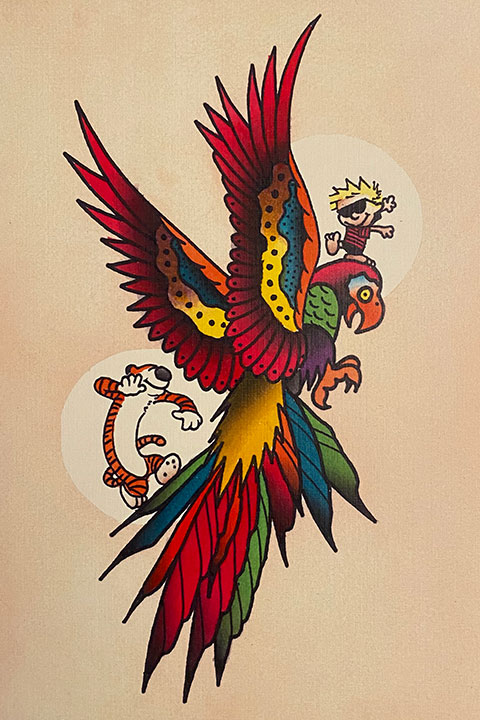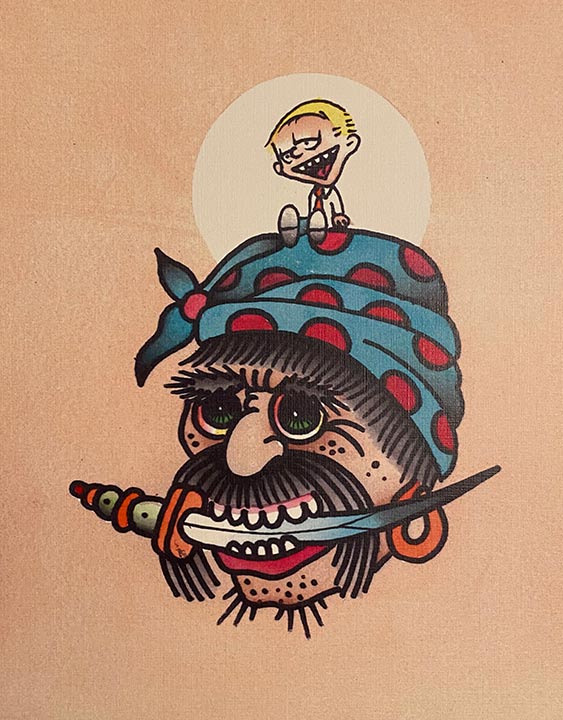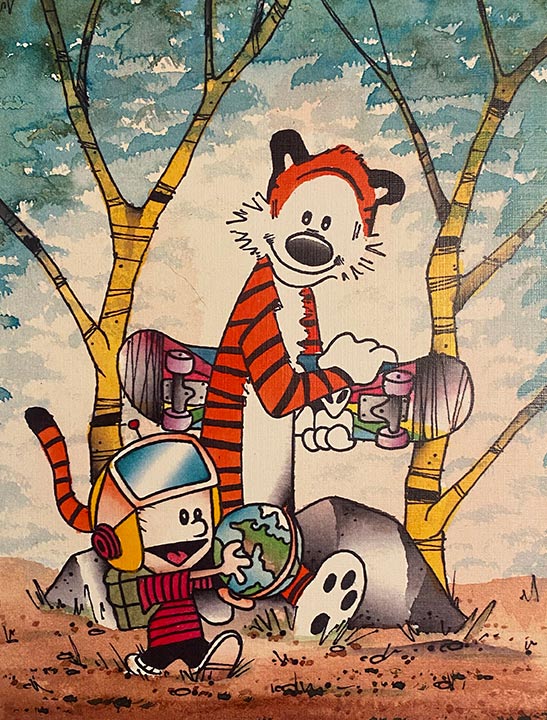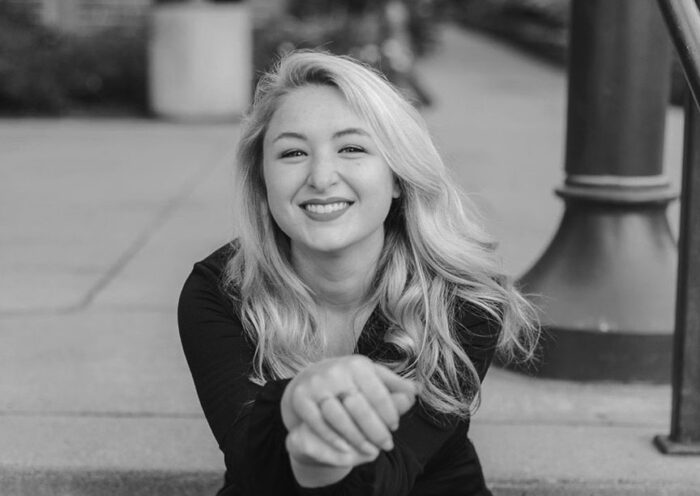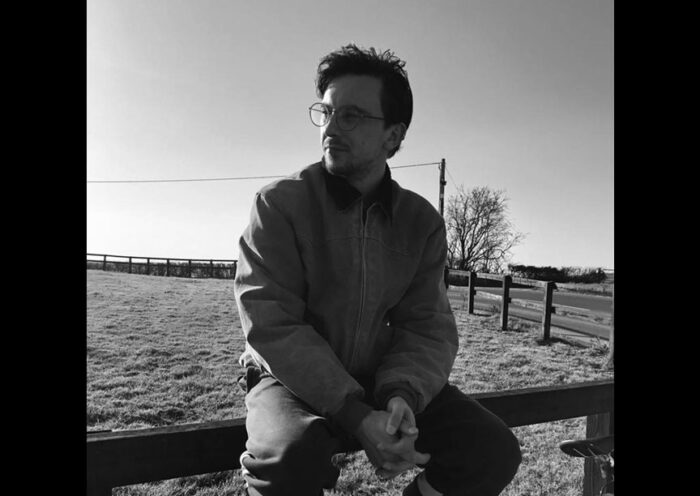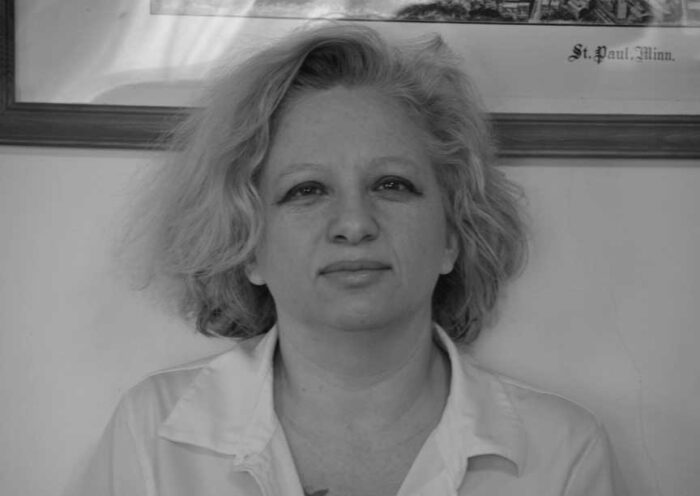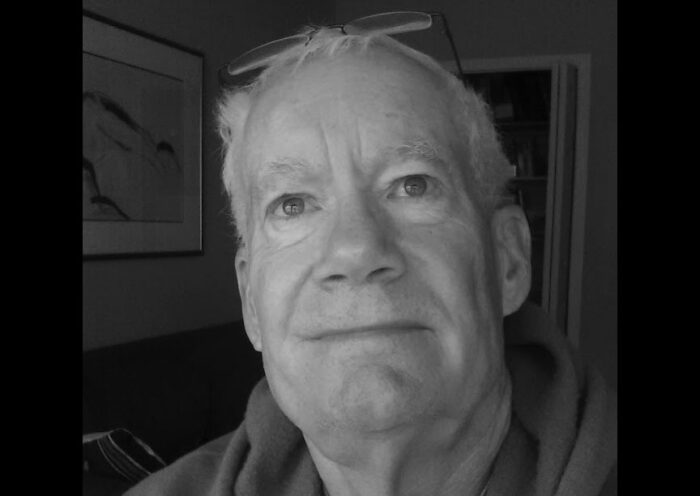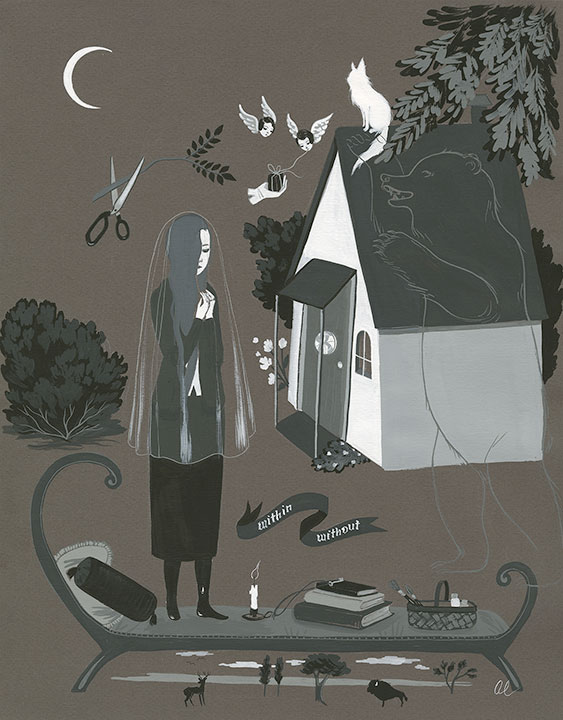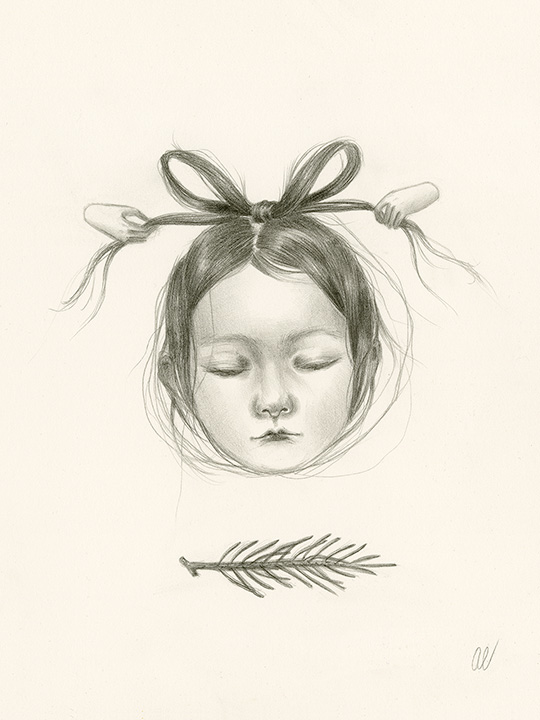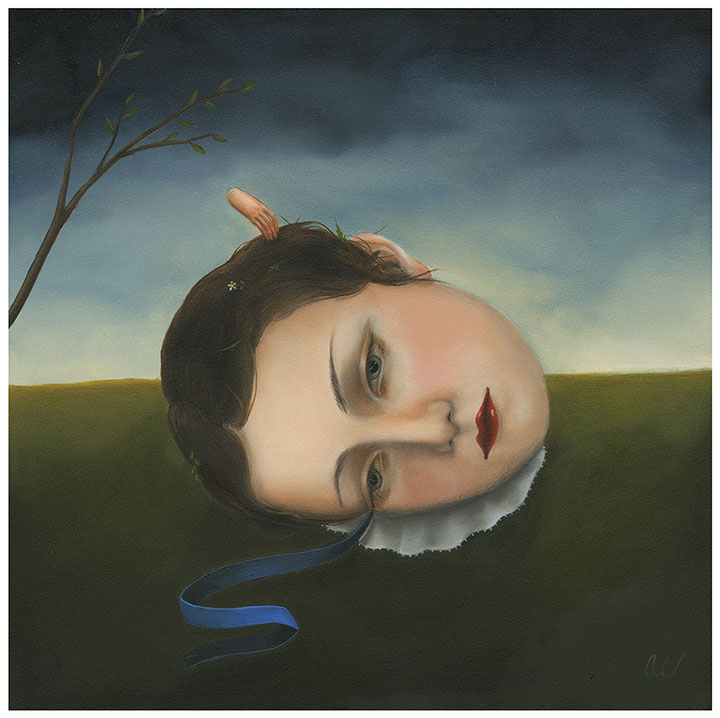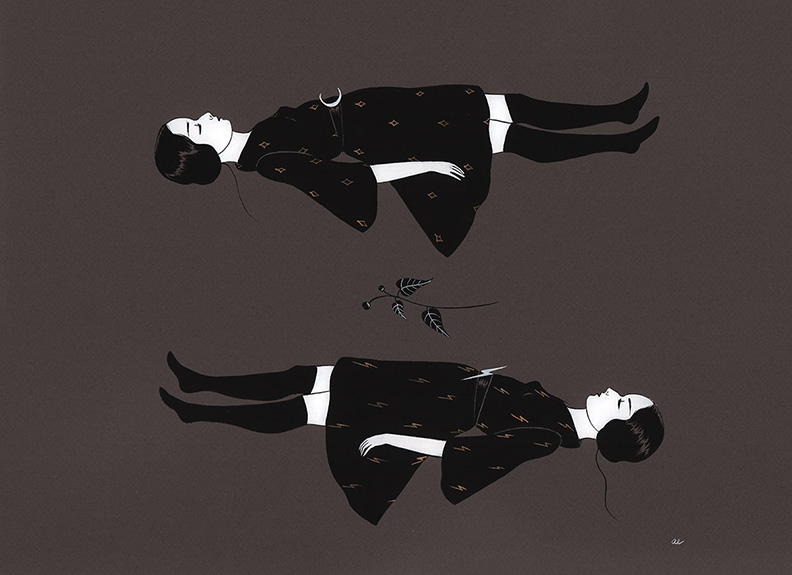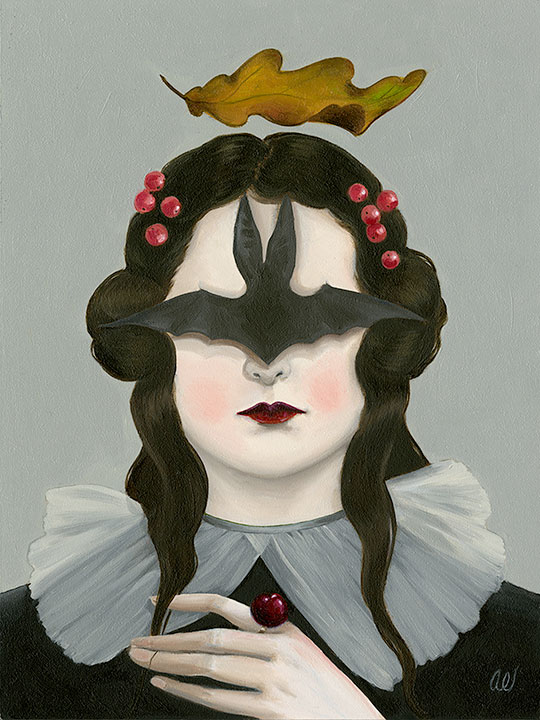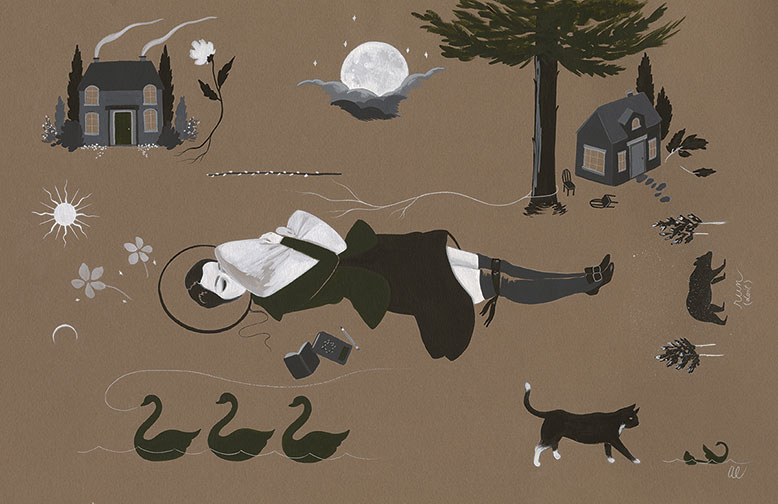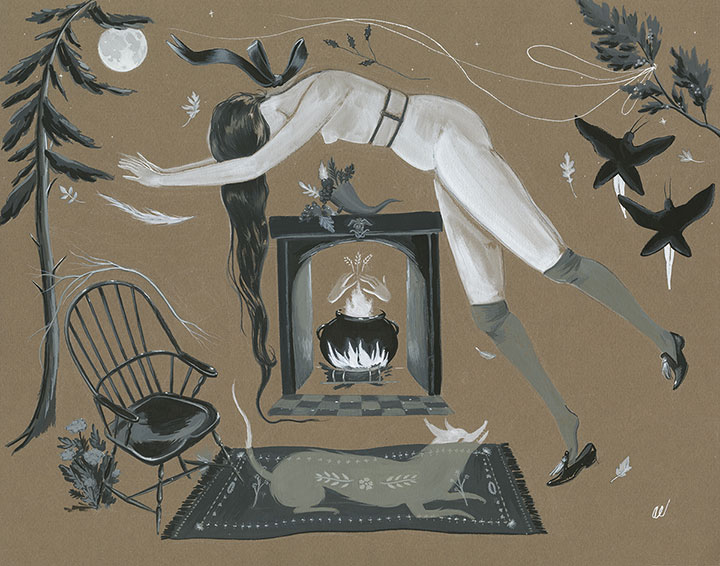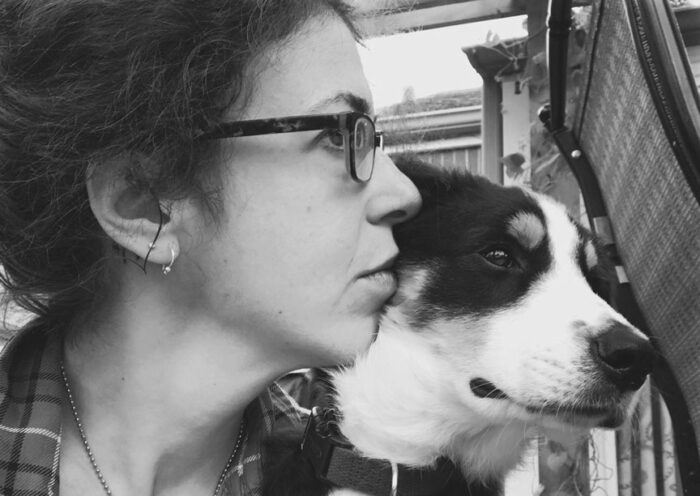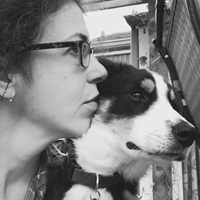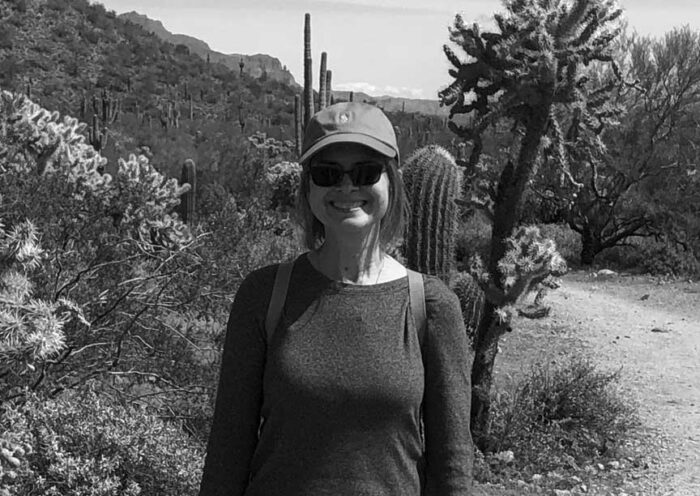Bradyphrenia
by Justin Reamer
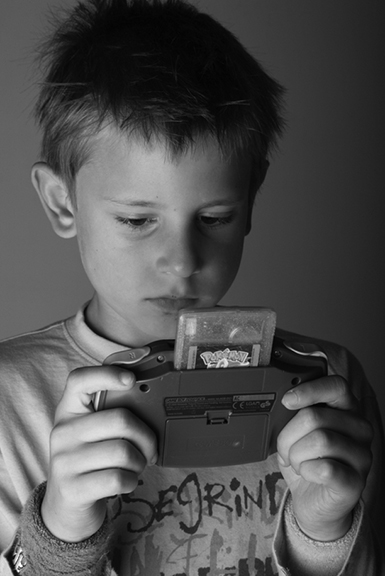
‘IT’S-A ME, MARIO!’ Mario. Next my pillow, smiling. Blue eyes glowing. Red hat. Letter M. Red M. Large nose. Large to pull. Eyes opening. My eyes. Mario looks. Sees me. Smiling. I tired. Mario smiling. ‘It’s-a me, Mario!’ Shouting. Happy. Eyes gaze on Mario. Mario friend. Mario my best friend. He like me. Mario happy. Brown hair under red hat. Black moustache. Hair different from moustache. Why different? Must like hair-dye. Wears red shirt. Red shirt under blue pants. Blue pants with yellow buttons. White gloves. Brown shoes. Mario happy. Me? Waking up. Tired. Still waking up. Mario wake me up. Eyes still adjusting. Hands still, feet still. Yawn. Tired. Body under covers, in bed. Feel warm. Body under covers. Bed comfortable. Humming of lights. Hmmmm… Low hum. Hmmmm… Very low hum. Hmm… Very, very low hum. Hmmmmm… Not too loud. Hmmmm… Humming not bad. Quiet. Not loud. Loud hurts my ears. Mario smiling still. Cannot feel my feet yet. Still in bed. Hands still, feet still. Can’t move. Feel tired. Why tired? Just woke up. Not move yet. Don’t feel like. Need to lie. Few minutes. Few if okay. Few I need. Few more, I need now.
Dryer loud downstairs. Hrrrrmmmm! It rolls. Hrrrrrmmmm! Very loud through muffled floor. Hrrrmmm! Continues to run. Very loud for ears. Very loud when close. Hrrrmmmm! Muffled when away. Not so loud. Slightly quiet. But loud even through floor. Hrrrrmmmm! Don’t like loud. Loud bad for ears. Can’t stand. No like. No like at all. Hrrrrmmmm! Continues to run. Mommy does dryer. Dryer for laundry. She uses for laundry. Does laundry with dryer. She like. I no like. Too loud. Hurt my ears. Hrrrrmmmm! Lights hum in my room. Hmmmm… Lights hum quietly. Hmmmm… Quiet unlike dryer. Hmmmm… Dryer too loud. No like dryer. Mario no like, either. Hurts his ears, too. Dryer loud for him. So says. I like quiet. You like quiet? Quiet nice. Soothing. Better for me. Too loud bad. Too loud hurts. Still in bed. Hear dryer downstairs. Dryer for laundry. Never want to be around. Bed warm. Bed comfortable. Mario like bed, too. Mario is my friend. We like bed. Bed nice and warm.
‘Good morning, Oak!’
A voice. Know that voice? Whose voice? Mommy’s voice. Mommy nearby. Mommy in my room. Mommy be here soon? Mommy, I know. Mommy nice. Mommy, I like. Mommy nice. Mommy nice to me. Mommy, I like a lot. Reads me bedtime stories. Mario like her, too. Mommy in my room. She has nice voice. I like Mommy a lot.
Mommy: ‘Time to get up, sweetie. We have to get you to school.’
Mommy entering room. Mommy now in room. Turns lights on brighter. Ow! My eyes! Hurts! Pain! Ouch! Hurt eyes. Eyes hurt. Close lids. Burns. Eyes burn. Eyes hurt. Huge owie. No like owie. Owie bad. Owie really bad. No like owie. Owies hurt. Need boo-boo bunny. Boo-boo bunny help pain. Boo-boo bunny make owies bye-bye. Boo-boo bunny good. Mario like bunny. Me like, too. Need bunny. Eyes hurt. No like hurt eyes. Owie. Owies hurt. Have bunny? Have bunny, Mommy? Need bunny. Eyes hurt. Please bunny. Like bunny. Need bunny. Eyes hurt. Please bunny. Need bunny, Mommy. Eyes hurt. Owie. Owie bad. Owie bad. Mommy? Speak.
Mommy: ‘Sorry, Oak.’
Still pain. Owie. Painful sting. Couple seconds. Bunny not here. Where bunny? Eyes hurt. Need bunny. Bunny. Where bunny? Eyes hurt. Owie? Owie going away? Still hurt. Voice? Voice speak.
Mario: ‘Oh, no!’
Mario shout. He upset, too.
Mario: ‘Mama mia!’
Mario upset. Lights hurt eyes. Both our eyes. Hurt both.
Mommy: ‘Sorry, Oak. I know it stings, but I didn’t mean to hurt you. I really am, sweetheart. Are you okay, honey?’
Agh! Wanna scream! Really wanna scream. Hurt eyes. Agh! I feel…What feel? Eyes adjust. Light not so bright, not so loud. Feel…better…Feel…okay…I okay. Mario okay, too. Smile. I laugh. It funny. I like laughing. Laughing fun. Laughing good for me. Laughing, I like. Eyes hurt no more. Mario like, too. No more pain. We like a lot. Happy, we are.
Mommy: ‘I’m glad to see you’re okay, Oak.’
Mommy smiling. I like Mommy. Mommy nice.
Mommy: ‘We have to get ready for school, okay?’
School? School. Place go every morning? Mommy take me? Is school? Yes. School. Place with tables and chairs. School. That’s name. School. Lights humming. Hmmmm… Low hum. Hmmmm… Still hums, even in bed. I hear. Hmmmm… Can hear lights. Hmmmm… Not loud. Okay. Mommy around. Important. Mommy nice. Trust Mommy.
Mommy: ‘Are you ready to get out of bed, Oak?’
Bed? Still lying. Body under covers. Should get out? Ready yet? Covers warm. Like warm. Warmth nice. Take myself out? Body ready to move? What do? Body get out of bed. I get out of bed. That I going do. My hands and feet out bed. Remove covers. Move hands and feet. Get out bed. Must get out of bed. Can get out of bed. Will get out bed. I get out bed. Shall succeed. Make Mommy happy. No make Mommy angry. Mommy angry when stay. Mommy no like stay. Get out make Mommy happy. Mommy nice when happy. Need make happy. Scary when angry. Need make happy. Be good boy. Nice when Mommy happy. I happy, too. Feeling my feet…my hands…my arms…my legs…still…slowly moving…now move. Pull off covers. Move feet. Move hands. Pull myself out bed. Feet on ground. Standing. Standing two feet. Out of bed. In bed no longer. Mario in arms. Mario happy, too. Mario out of bed, too. Me and Mario happy. We out of bed.
Mommy: ‘Great job, Oak. Now, it’s time to take your medication.’
Lights humming in background. Hmmmmmm… Low hum still. Hmmmmmmm… Very quiet. Still hear. Not so loud. Mommy reaches. What reaching for? Bottle. Brown bottle. Brown bottle, white cap. Look funny. Rattles. Rattles like maracas. Venomous? Is it? No, not venomous. Rattlesnake venomous. Bottle not. Bottle rattle, though. Sounds funny. Stings my ears a little. Ch! Ch! Ch! Ch! Rattles. Bottle rattles. Loud. Ch! Ch! Ch! Ch! Hurts my ears. Mommy stop? Please? Hurts. Please stop. Grab bottle, but Mommy snatch. ‘It’s okay. We’ll just make sure you get your medication, okay?’ Bottle open. Pwuh! Puts finger in bottle. Grabs square. White square come out. Fingers hold it. Holds what? White square? What is? Pill? Oh, no. Pill taste bad. No like pill. Mommy hold, look at me. Avert gaze. Lower eyes. No want pill. Pill taste bad. Gross.
Mommy: ‘Now, put this in your mouth and swallow, okay, Oak?’
Puts in mouth. Taste bitter. Yuck! Very gross. Taste terrible. Want to spit out. Swallow, though. Must swallow. Swallow make Mommy happy. Mommy nice when happy. Be a good boy. Swallow bitter pill. Taste terrible. Mommy happy, though. Better when Mommy happy. Close bottle. Put away. Rattle stop. Takes out another. Repeat three times. All yucky, all gross. Don’t like. Taste bad. All them. Tastes blucky. Must swallow, though. Swallow, Mommy happy. Like my Mommy happy. I good boy. Swallow. I swallow. Mommy happy. I good boy. Mommy happy now. I happy, too. Me good. I love Mommy. Mommy the best.
Mommy: ‘Okay, Oak. Time for you to use the bathroom, oaky?’
Bathroom? What that? Bath. B-A-T-H. Bath. Water. Splashing water. Lots of water. Toys inside. Soaps and suds. Bubbles. Warm water. Bath. Bathtub. That bath. Room. R-O-O-M. Tables. Chairs. Couch. TV. Nintendo. Rug. Carpet. Room. That room. Bath-room. Bathroom. Room where bath is. Room I take bath. Bathroom. That’s bathroom.
Mommy: ‘I’ll get you dressed after you go potty, okay?’
Mommy grabs hand. Holds hand. Walks with me. Walk toward door. Grabs doorknob. Fingers rotate. CATCHIKH! Doorknob rotates. Door opens. ERRRRREEEEEEE! Door screeches. Ouch! Loud in ears. Very loud. Hurts. Really hurts. Tears in eyes. Really painful. Can’t stand. Really hurts. Really hurts a lot. Really…
Mommy: ‘It’s okay, Oak. I have you. You’re going to be okay. Come with me.’
Mommy comforts me. Feel calm. Voice soft, soothing. Relaxing. Like her voice. Voice nice. Voice very nice. I like Mommy. Mommy really nice. Mommy best. Okay now. I okay. Will be okay. Walk down hallway. Leading me. Holds hand. Another door. Already open. Lights buzzing. Hmmmmmm… Low hum. Hmmmmmm… Walk into room. Room big. Bright lights. Blue paint. Hmmmmmm… Lights hum. Always humming. Hmmmmmm… Giant bowl in corner. Leads me toward it.
Mommy: ‘Time to go potty, Oak.’
Giant bowl in front. Leads me to it. Bowl full of water. Has seat. Seat like chair. Opens seat. DUNK! Porcelain. Seat clanks with porcelain. This bowl has water. See handle. Silver handle. Flushes. Oh, no! No like flushing! Flushing loud in ears. Hurt my ears. No like. Please, Mommy. No like. Please.
Mommy: ‘It’s okay, Oak. Just go potty, okay?’
Okay. Make Mommy happy. Like Mommy happy. Need to make. No make in pants. Makes Mommy angry. Need to make. No make in pants. Be a good boy. Hold my butt. No make in pants. Need to make. Hold my butt. Make Mommy happy. No make in pants. Go in white bowl. Make Mommy happy. Be a good boy. I good.
Mommy grabs waist. Lifts me off ground. Flying. I fly. Feet dangling. WHEEE! This is fun! I airplane. I like flying. Flying fun. Can do more? Land on seat. Mommy place me. Need make. I high above ground. Feet dangling. Can see floor from above.
Mommy: ‘Go potty, Oak. Are you ready?’
Need to make. Hold butt for Mommy. No want Mommy angry. Need to make. Wait for Mommy. No make in pants. Make Mommy angry.
Mommy: ‘I am going to take off your pants, Oak, and then you can go potty. Are you ready?’
Chick! Button unbuckled. Zzzzp! Zipper lowered. Pulling down pants. Feels funny. Feels very funny. No like. No like. Cannot stand. Please stop. Please stop, Mommy. No like. No like. Tears. Mommy…
Mommy: ‘It’s okay, Oak. I’ve got your pants down. Now, you can go potty.’
Butt on seat. Cold seat. Brrrrrr! Very cold. No like cold. Brrrrrr! Shiver. Very cold seat. No like cold seat. Brrrrrr! Then go. Need make. Make now. Pluck-plakh! Make. Spsh! Splash in water. Sound funny. Feel better. Less pressure. Pluck-plakh! More sound. Spsh! Another splash. Sound funny. Less pain. Make in white bowl. Not in pants. Make in bowl. Pppppffffffffft! A sound. Funny sound. Sounds funny. Ppppfffffft! Funny. Funny sound. Laugh. So funny. Can’t stop laughing. Butt speak. Butt sound funny. Why butt sound funny? Why speak in funny? Ppppppppppfffffffpppppptt! Butt speak again. Laughing. So funny. Laugh. I like sound. Sound funny. Can’t stop. Pppppffttt! Laugh more. Funny. Like funny. Butt funny. I like butt. Butt an old friend. We old friends. I like butt. Mario like, too. Make funny sound. Make Mommy happy.
Mommy: ‘All right. That’s enough, Oak. Let’s get you down, okay?’
Mommy bend over. Grab waist. Fingers wrapped around me. Lifts me. Flying. I fly again. Land on the floor. Feet on floor. Feel feet on ground. Ground very still.
Mommy: ‘I’m going to pull up your pants, okay? Then we’ll get you changed.’
Fingers grab pants. Lifts them up. Feels weird. No like. No like at all. Zzzzzp! Zipper up. Chick! Button buttoned.
Mommy: ‘Good. Now, I’ll flush the toilet.’
Toilet? What that? Mommy look at bowl. Giant bowl. Hand out, lever reached. That bowl. No! Loud in ears. No like flush. Flush bad for ears. Tears in eyes. Please, Mommy. Please no. Hurt ears. Please. No me like. Hurt ears.
Mommy: ‘I’m going to flush this, okay, Oak? You might want to leave the room.’
Leave the room? An exit? Move head. Door behind me. Open. Move legs. Run behind door. Wall. Brown wall. Crouch. Crouch on ground. Cover ears. Giant waterbowl loud. Too loud. Cover ears. Don’t like pain. Hurt ears. PHECH-EWWWW-WHOOSHHHHH! Loud flush. Very loud. AHHHH! Hurting ears. Ouch! It hurts. Can’t stand it. GAAAAHHH! Hurts ears. No like. Make it stop! Make it stop! Painful. Make it stop! QUA-QUA-QUA! More noise. Toilet painful. Tears in eyes. Really hurts. Can’t stand it. Really hurts. A lot. Gaaahhhh! Make it stop! Make it stop! Hurting me. Gaaahhhh! Cannot compute! Cannot compute! Head no work. No work. Make it stop! Pounding head. Cannot compute. Pounding head. Head against wall. Brain won’t work. Gaaaaahhhhhh! Thud! Thud! Thud! Thud! Banging head. Thud! Thud! Thud! Thud! Head banging. Thud! Thud! Thud! Thud! Too much noise. No workie! Gaaaaaaahhhhh! Thud! Thud! Thud! Thud! No workie. No workie. Bad. Bad! Thud! Thud! Thud! Thud! Bad. Too much. Really bad! Thud! Thud! Thud! Thud! No workie.
Mommy: ‘Oak, what are you doing?’
Thud! Thud! Thud! Thud!
Mommy: ‘Oak, stop that! You’re gonna hurt yourself.’
Thud! Thud! Thud! Thud!
Mommy: ‘Oak, cut it out. Stop banging your head. You’re going to hurt yourself. Stop it, you hear me? Stop it!’
Thud! Thud! Thud! Thud! Gaaaahhhh! Thud! Thud! Thud! Thud! Ugh! Collapse. Back on ground.
Mommy: ‘Oak?’
Tired.
Mommy: ‘Oak?’
Tired.
Mommy: ‘Oak, are you okay?’
Tired.
Mommy: ‘Oak, sweetie, are you all right?’
Tired.
Mommy: ‘Oak?’
. . . . .
Long pause.
Mommy: ‘Oak, it’s okay, honey. Mommy’s here.’
Brain back. Tired.
Mommy: ‘It’s going to be okay.’
Wake up. Stand.
Mommy: ‘You ready to get up and get changed?’
Yup. I love Mommy. Tired, but love Mommy. Time to get up. Get up. Change.
Mommy: ‘Sorry I hurt your ears, Oak.’
Mommy nice.
Mommy: ‘It’ll be okay.’
Love Mommy.
Mommy: ‘Let’s get changed, okay?’
Mommy help me. Mommy change. I change. Clothes change. Change clothes. Downstairs we go. I like Mommy. Mommy the best. Continue downstairs. Mommy the best.
Table. Brown table. Shiny table. Shiny table glowing under yellow light. Light humming. Hmmm… Table brown under yellow light. Yellow light illuminate room. White light far off. Table brown. White and yellow light, both on ceiling.Mario on table. Mario happy. I in chair. Sitting in chair. Waiting for Mommy. Mommy here, too. Someone else. A voice.
Voice: ‘What happened to Oak, Mommy?’
Sister. Emily. Emily’s voice.
Emily: ‘Why was he crying?’
Mommy’s voice.
Mommy: ‘He was upset, Emily. That’s all. Why don’t you eat your breakfast, okay?’
See Mommy’s voice. Eyes gaze at table. Mario in lap. Mario see Mommy, too. Mario understand. Emily speak.
Emily: ‘Okay, Mommy. I still think he’s weird, though. He cries too much.’ No understand. Weird? What mean? Buzzing lights. Hmmmmm… Low hum. Hmmmm… Not loud. Quiet enough. I like quiet. No hurt ears.
Mommy: ‘Now, don’t say that about your brother, Emily. He’s just different. That’s all.’
Humming lights. Hmmmm… Low hum. Hmmmm…
Emily: ‘But why can’t he be normal like the rest of us? He always wastes so much time. He’s such a weirdo.’
Weirdo? What mean? What weirdo? Who? Weirdo? Barking dog. Arf! Rover. Beneath table. Arf! Barking. Arf! Arf! Barking a lot. No like. Mario no like, either. Humming lights. Hmmmm… Low hum. Hmmmm…
Mommy: ‘Just eat your breakfast, Emily, so we can go to school. Sound good?’
Clang! Bowl on counter. Really loud. Clang! Ding! Dang! Bowl on table. Very loud. Need cover ears. Ears can’t stand. Hurts ears, noise does. No like. I no like at all. Lights hum, too. Hum like bumblebees near flowers. Hmmmmm… Low hum. Hmmmm… Hovering bumblebees in garden. Hmmmm… Pollen tasty. Hmmmmm… Low hum.
Emily: ‘Yes, Mommy.’
Humming continues. Blowing air vents, too. Whirr. Whirr. Wind blowing. Whirr. Whirr. Hear in ceiling. Whirr. Whirr. A soft blow. Soothing to Mario. Soothing to me. Nice. Like wind. Nice wind. A voice. Hear it? Whose? Mommy’s. Mommy speaks.
Mommy: ‘Now, Oak, I’m going to pour you some cereal, okay? Let’s eat breakfast so we can get you to school.’
Brown table glows in yellow light. White light even brighter. What saying?
{Breakfast school?}
Are they words?
Emily: ‘No, we’re not having breakfast at school, Oak. We’re having breakfast here. You’re not that stupid, are you?’
{Stupid?}
No not say. What mean?
Mommy: ‘Emily, be nice to your brother. Eat your cereal, okay?’
Humming lights. Whirring breeze. Mario smile. Mario understand.
{Breakfast school?}
Smile. Mommy smile. Smile back. Why smile? Mommy speaking.
Her voice: ‘Yes, Oak. We’ll get you to school. Let’s eat your breakfast, okay?’
Cling! Bowl on counter. Ouch! Loud. Very loud. Hurts. Hurts ears. ‘I’ll pour you cereal, okay?’ DING-DING-CLANG-DING! More crashing. Ouch! Loud. No like. Really no like. Hurts ears. No like. PSH-WHOOOOSSSSHHH! Pouring of liquid. What that? Not sound good. No like.
Mommy: ‘All right, Oak. Eat up.’
Mommy’s hands. Hands on table. Bowl. Bowl placed in front. Front of me. See in my eyes. Bits and orts. Grains. Food grains. Food grains floating in liquid. White liquid. What liquid? Milk. White liquid milk. Silver thing. Silver utensil. Spoon.
Mommy: ‘Eat up, Oak.’
Cling! Spoon on bowl. Ouch! Hurts. Not nice. Crunch, crunch, crunch! Chewing. Sister chewing. Emily chewing. Chewing cereal. Gulp! Swallow. Swallow cereal. Cereal down throat. Cling! Spoon again. Collides with bowl. Hurts. Cover my ears.
Mommy: ‘Right, I forgot your earmuffs. Here, Oak. Use these.’
Earmuffs over ears. Muffs good. Muffs better than none. Allow me to quiet. Quiet always nice. Going to eat cereal. Going to grab spoon. Going put food in mouth. Going to chew. Going to swallow. See my hand lifting spoon. See put food in mouth. See me chew. See me swallow. Can eat cereal. Can grab spoon. Can put food in mouth. Can chew. Can swallow. Fingers move. Move fingers. Fingers twitch. Raise hand. Right hand. Hand reach bowl. Fingers grab silver. Can do it. Can do it. Can do it always. Fingers silver wrapped. Lift right hand. Milk flowing in curve. Grains flowing in. Lift hand to head. Spoon in mouth. Close mouth. Wrap lips around. Move spoon out, hand backward. Chew grains. Crunch, crunch, crunch. Chewing. Tastes sweet. Soggy. Very soggy. Like moist sugar. Gulp! Swallow. Liquid down throat. Grains down throat. Repeat. Clang! Spoon against bowl. Crunch, crunch, crunch. Chewing. Gulp! Do again! Tastes good, too. Repeat. Repeat. Want more. Scooping and scooping. Bowl empty. Full. Stomach full. Feel better. Food good. Cereal good. Not bad. I like. Mario likes, too. We both happy. Wait Mommy. See what Mommy says. Mommy knows best.
Muffs off.
Mommy: ‘All right, Oak. I’ll brush your teeth for you. Let’s go upstairs, okay?’
Scratch head.
{Upstairs?}
Confusion. Not sure. What she want?
Mommy: ‘To the bathroom, Oak. We’ll brush your teeth.’
Bathroom. Flushing toilet. No like sound. But bathroom. Understand! Love baths. Mario, too. ‘It’s-a me, Mario!’ Mommy.
Mommy: ‘No, Oak. Mario doesn’t need his teeth brushed. Please leave him here.’
Takes Mario.
Mommy: ‘Let’s brush your teeth.’
To bathroom. See Mario soon. Bye, Mario! See you soon! Mommy hold hand. Walk stairs. Back to bathroom. Lots of walking. Stairs big. Move up. Reach the top. Hallway above. Go in door. Shhhhh! Water running. Faucet, sink. Emily. Emily brushing teeth. Chigga-chigga-chigga! Scraping teeth. Sounds weird. Shhhhh! Still running, water in sink. Shhhhh! Sounds nice. Not too loud. No hurt ears. Me like. Mommy standing at sink.
Voice: ‘Okay, Oak. We’re going to brush your teeth, okay?’
Drrrruurrrr! Open drawer. White tube. Long and white. Long and white with cap. Fwit-fwit! Cap off. Plickew! Paste on brush.
Mommy: ‘Open wide, Oak.’
Open my mouth.
Mommy: ‘Say, “Ah!”’
Open mouth.
{Ahhh!}
Brush in mouth. Scrubbing teeth. Feels weird. No like. Brush. Brush continues. No like. Chigga-chigga-chigga-chigga! Scrubbing teeth. No like. Hurts teeth. Chigga-chigga! Chigga-chigga! Brushing. Minty taste. Gross. Blucky. No like. Taste bad. No like. Chigga-chigga! Chigga-chigga! Brushing finish.
Mommy: ‘All right, Oak. Rinse out your teeth.’
Ptooie! Spit out paste. Gross. Mint gross. Taste bad. Bleckh! Disgusting. No like. Taste really bad. Ilkh! No like. Gragga-gragga! Water in mouth. Schwuck-schwuck! Shake head. Water in mouth. Ptooie! Spit out. Disgusting. Bad taste. Taste gone. Better.
Mommy: ‘Great job, Oak. Now, we’ll go to school. Come on, Emily. Let’s go.’
Bring Mario?
Mommy: ‘No, Oak. Mario must stay here. He can’t be in school. You can bring your shell, though. How about that?’
Green shell. I take. Shell in pocket. Go to school. Bye, Mario! See you soon! Must go to school. Shell stay with me. I like shell. Shell soft. Soft in hand. Shell good. Like shell. Like shell lots. Go school. We go school. School nice. School good. Shell good. Shell nice. Shell like. Like shell. Go school now.
Mommy: ‘All right, Oak. Let’s put on your shoes.’
Shoes? What shoes? Look shoes. Shoes where? Mommy find thing. Picks up.
Desk. Big brown desk. White light. Buzzing. Bzzzzz… Buzzing white lights. Bzzzzz… Buzzing loudly. Very noisy. Loud. Distracting. Hurts ears. No stand. No standie. Very loud. No like. Need quiet. Bzzzzz… More sound. Scratch, scratch. Pencils. Lots of pencils. Pencils on paper. Scratch, scratch, scratch. Many pencils. Scratching paper. Very loud. Scratch, scratch, scratch. Very loud on every desk. Very, very loud. Makes anxious. Bzzzz… Low hum. Scratch, scratch, scratch. No stand. DV-VWVWVWVWVWVW! Roaring engine. Mama mia! Sharpener. Even louder. Hurts ears. Hurts a lot. DV-VWVWVWVWVW! Roar. Bzzzzz… Ugh. Scratch, scratch, scratch. Gah! ‘Enough of the pencil sharpening. Get back to your seats.’ Shell in hand. Twirling shell in hand. DV-VWVWVWVW! Roar too loud. What do? No standie. No stand. Scratch, scratch, scratch. Ugh. Bzzzzz… Ouch. Too loud. Must cover ears. Ears hurt. Must cover. DV-VWVWVWVWVWVW! Covering ears. No stand. No stand. Covering ears. Too loud. Too loud. No workie. No…
Voice: ‘Oak, are you okay?’
Hand on shoulder.
Voice: ‘It’s okay. Here are some headphones. You can use them.’
Quiet. Headphones on. Quiet. Much better. Shell in hand. Feel good. Much better. Calmer. Feel calm. Soothing. Like Mozart. Mozart nice. Mozart good on ears. I like Mozart. Mario like, too. We both like. Both happy, too. Teacher walk in front. Name? Think of name. Thinking. Mrs. Ashby. Mrs. Ashby talking. What say? I no know. Voice next me. Woman. Tall. Give me headphones. What name? Ms. Janca. J-A-N-C-A. Sounds like ‘YAHN-kuh,’ not ‘JAN-kuh.’ Janca with j sound like y. My what word? Trying find. What word? Help? Other word? Aid? She my aide. She Mommy’s friend. Mommy like her. Ms. Janca like Mommy, too. I like. Mario like, too. Both happy. Like Ms. Janca. Ms. Janca helpful. Ms. Janca good. Ms. Janca nice. I like very much. She always good. I’m happy always.
Tap on shoulder. Tap on left shoulder. Poke. Hurt little. Ouch. Flinch. No touchie! No like touch. Hurt a bit. Skin hurt. No like. No like at all. No touchy. But mean something? What mean? Attention? What wrong? Mozart playing. Headphones on. Move head left. Move eyes left. Peer over shoulder. Woman kneel. Kneeling on ground. Head at eye level. Long, dark hair. Cream skin. Blue eyes. Gold necklace on neck. Very shiny. Voice speaking. Can’t hear. Hands over head. Remove headphones. What happening? Buzzing lights. Bzzzzz… Low hum. Bzzzzz… Barely hear. Bzzzzz… Ms. Janca. Look in eyes, speaking. Voice, I hear. Voice, I see. ‘Hey, Oak. It’s time to take out your iPad. Mrs. Ashby says we’re going to do reading this morning. Are you ready?’ iPad? Not with me. Ms. Janca has. Not me. No have. She has.
Janca: ‘Here, let me take out the iPad for you.’
Eyes watch. Pull off purse, Ms. Janca. Lower on ground. Reach for clasp. Click! Clasp open. Zip! Unzip zipper. Hand reach inside. Rumble, rumble. Fingers dig purse. Rumble, rumble. Digging, searching. Rumble, rumble. Still digging.
Janca: ‘Aha! Here it is!’
Fingers grasp item. Pull out. Black rectangle. Big black prism, rectangular, come out bag. Zip! Zipper zipped. Click! Clasp shut. Purse back over arm. Black rectangle. Big black rectangle. Dark screen. Silver back. Case enclosed. Enclosed red case. iPad? Is it? Black rectangle iPad? Tablet? Called tablet? Yes, is tablet. Also, iPad. iPad, it is.
Janca: ‘Here is your iPad, Oak. Here, let me open it for you.’
Mess with iPad. Fingers moving, eyes moving. I watch. Watch Ms. Janca move fingers.
Janca: ‘Here it is. Now, when I give it to you, plug your headphones in, okay?’
Will do. Put iPad on table. Plug in headphones.
Janca: ‘Now, we’re going to read Maniac Magee with the rest of the class. Are you ready?’
Nod. Ready read. Ready learn. Reading nice. Push sideways triangle. Play. Text on screen. Highlight so I read. Voice read. Ears listen, eyes follow along. No read without iPad. Too hard. Headphones help. iPad good for reading. Follow along very well.
Going to read. Going to sit in chair. Going to sit still in chair. Going to watch iPad. Going to listen to iPad speak. Going to hear iPad’s voice. Going to follow along. Going to follow highlight. Going to follow highlight text. Going to read book. Going to read Maniac Magee. Going to read with rest of class. Going to understand book. Going to learn. See me read. See me sit in chair. See me sit still in chair. See me watch iPad. See me listen to iPad. See me hear iPad’s voice. See me follow along. See me follow highlight. See me follow highlight text. See me read book. See me read Maniac Magee. See me read with rest class. See me understand book. See me learn. Can read. Can sit in chair. Can sit still in chair. Can watch iPad. Can listen to iPad speak. Can hear iPad’s voice. Can follow along. Can follow highlight. Can follow highlighted text. Can read book. Can read Maniac Magee. Can read with rest of class. Can understand book. Can learn. Can do anything. Can be me. I like me. I can do it!
Stare at iPad. Black letters. Letters? Letters: alphabet. Alphabet? Alphabet: a, b, c, d, e, f, g… Letters make words. Letters a and s = as. Letters d, o, and g = dog. Letters make sounds. G = guh like baby: Goo-goo, ga-ga! D = duh like Banjo: Duh-huh! B = buh like sheep: Baaaaahhhhh! M = muh like cow: Merrrrrrrrr! U = uh like Goofy: Uh-hyuh-uh! Letters make sounds. Sounds make words. Words reading. Looking iPad screen. Voice speaks. Highlight appears. Highlight moves with sound. Voice in ears: <Chapter 2. ‘Everybody knows that Maniac Magee (then Jeffrey) started out in Hollidaysburg and wound up in Two Mills. The question is: What took him so long? And what did he do along the way?’> Voice continues reading. Ouch! Kick under table. Flinch. What that? Hurt. Leg hurt. Voice read. Can’t listen. Kick again. Ouch! What that? Who hurt? Look up. Boy. Front of me. Cross table. Smiling. Kick me? Again kick. Ouch! Hurt! Flinch. Lot pain. Boy smile. Laugh. He kick me! Boy name? Steven. Steven Hayworth. Steven kick me! Kick again. Ouch!
{Stop…}
Speak no. Hard speak. But try. Hurt. Leg hurt. Steven laugh.
Steven: ‘What are you gonna do about it? Idiot.’
Kick again. Ouch! Hurt. Stop! Please. Please stop. Steven laughs. Laughs hard.
Steven: ‘That’s what you get for being an idiot!’
Mad. Can’t stand it. Throw headphones off. Gaaaah! Stop! Kick again.
Steven: ‘Take that, retard!’
Ouch! Hurt.
Steven: ‘That’s what you get for being an idiot!’
Laugh. Not funny. Cannot compute. Cannot compute. Cannot… Scream! Head bang. Thud! Thud! Thud! Thud! Brain! Cannot compute. Cannot compute. Thud! Thud! Thud! Thud! Cannot compute. Sensory overload. Cannot compute. Thud! Thud! Thud! Thud! Information breached. Brain jacked. Cannot compute. Sensory overload. Cannot compute. Too much noise. Cannot compute. Thud! Thud! Thud! Thud! Head banging. Thud! Thud! Thud! Thud! Cannot compute. Cannot compute. Thud! Thud! Thud! Thud! ‘Oak, stop banging your head! You’re going to hurt yourself.’ Thud! Thud! Thud! Thud! Cannot compute. Cannot compute. Thud! Thud! Thud! Thud! Cannot compute. Cannot compute. Thud! Thud! Thud! Thud! Brain! No brain! Brain! Screaming. Crying. Head banging. Tears in eyes. Thud! Thud! Thud! Thud! ‘Oak, stop it!’ System shutdown. 3, 2, 1… Disconnect. System terminated. Time to recalibrate…
Janca. Voice: ‘Oak, what’s wrong?’
Exhausted. Very tired. Very, very tired. Uhhhhnnnnnhhhhh…
Steven. Voice: ‘Ha ha! You’re an idiot!’
Sleepy. Can’t think. Can’t pay attention. Sleepy. Feel tired.
Janca. Voice: ‘Steven, stop being mean to Oak. You must behave.’
Sleepy…Very…Tired…Very, very tired…
Ms. Ashby. Voice: ‘What’s going on, Cheryl? Is something wrong? Why was Oak banging his head?’
Sleepy…Cannot pay attention…Very, very tired…Uhhhhhhhhhgghhhhh! Feel sick. Very, very sick…
Ms. Janca. Voice: ‘Oak is sick. I’ll take care of him.’
Janca bend. Grabs hand.
Voice: ‘Come on, Oak. Let’s get you outside, okay?’
Hold hand. Help me on feet. Ugh. Feel very sick. Legs feel wonky. Can’t balance. Lights hum. Hmmmm… Hmmmm… Low hum. Hmmmm… Hmmmm… Very sick. Legs wobbly.
Janca: ‘Come on, Oak. I know you can do it. Let’s go to the hallway, okay?’
Help on feet. Move feet. Left foot, right foot. Left foot, right foot. Step forward. Little step. Me no like. But tired. Need hallway. Noises too loud. Room too loud. Need rest. Left foot, right foot. Left foot, right foot. Holding hand. Janca carry. Ms. Janca nice. Like Ms. Janca. Nice lady. Happy with her. She make happy. Left foot, right foot. Left foot, right foot. Near door. Door come close. Janca: ‘We’re almost there, Oak.’ Left foot, right foot. Left foot, right foot. Tired. Very tired. Cannot stand. Janca: ‘Almost there.’ Left foot, right foot. Left foot, right foot. Tired…Left foot, right foot. Ptuck! Hand grab door. Click! Hand rotate knob. Errr-errr! Door creek. Janca open door.
Janca: ‘All right, Oak. Let’s go in the hallway, okay?’
Left foot, right foot. Left foot, right foot. Errr-errr! Door creek. Kthunk! Door close.
Janca: ‘Sit down, Oak, okay? Just sit and relax.’
Sit down. Brain tired. Very tired. Need rest. Recalibrate. Tired. Sleepy. Sleep now. Sleepy…
Bzzzt! What now? Where? Where I? Bzzzt! Bzzzt! Buzz? What that? Black brick? Bzzzt! Bzzzt! Black brick. Always buzzing. Black brick buzz. Buzz like a bee. Bzzzt! Bzzzt! Office. Quiet. Office. Tikka-takka-tikka-takka. Fingers on board. Typing? Tikka-takka-tikka-takka. Typing? Typing. Keyboard. Fingers on keyboard. Tikka-takka-tikka-takka. Person typing. Who? No know. Tikka-takka-tikka-takka. Typing. Weird. Quiet. Nice, quiet. Where I? Hand in pocket. Reach inside. Find object. Grab. Pull out. Shell. Shell here. Green shell. Koopa shell. Soft. Soft in hand. Look at shell. See top. Green top. Shapes. Count shapes. One shape. Two shapes. Three shapes. Four, five, six. Seven, eight, nine. Ten, eleven, twelve. Thirteen. Thirteen shapes. Thirteen shapes on top. What this? Not same? Shapes not same. Two not same shapes. One shape: six sides. Hexagon. Like beehive. Bumblebees. Bzzzz! Hexagon many. Other shape: three sides. Triangles. Like Egypt. Egypt pyramid. Mummy. Oooooh-oohhh! Scary movie. Scooby-Doo. Triangle many. How many? One, two, three. Four, five, six. Seven. Seven hexagons. Other? One, two, three. Four, five, six. Six triangles. Hexagons: seven. Triangles: six. Thirteen shapes on top. Shell many shapes. Rotate. Rotate shell. What this? White rim. White rim, round shell. White rim. Top and bottom. Not same. Rotate. Hand rotate shell. What this? See bottom. Bottom shell. Bottom not same. Shapes not same. One? Round. Round circles. Black round circles. Other? Four sides. Not same. Long and short. Rectangles. Lot rectangles. How many? Circles. Count circles. One, two, three. Four, five, six. Six circles. Rectangles? Count rectangles. One, two, three. Four, five, six. Six rectangles. How many total? Shapes. Count shapes. One, two, three. Four, five, six. Seven, eight, nine. Ten, eleven, twelve. Twelve shapes. Six circles. Six rectangles. Feel good in hand. Like shell. Feel good. Shell nice. Miss Mario. Wish had Mario. Mario friend. Shell nice, miss Mario. Shell fine now. A voice. Someone speak. Ms. Janca.
Janca: ‘Hey, Oak, are you feeling okay? You seem to be fine.’
Okay. I okay. What next? Where go?
Janca: ‘Well, Oak, we’re going to recess, okay?’
Recess? What recess? Playtime? Is playtime? Playtime nice. Where go? Playtime? Playtime nice. Play good. Like playtime. Where go next? Janca hold hand.
Janca: ‘What’s this?’
Titta-titta-titta-titta! Titta-titta-titta-titta! Hear sound. Titta-titta-titta-titta! Titta-titta-titta-titta! Sound outside. Titta-titta-titta-titta! Titta-titta-titta-titta! On roof. Titta-titta-titta-titta! Titta-titta-titta-titta! But what? Titta-titta-titta-titta! Titta-titta-titta-titta! Scratchy sound. Titta-titta-titta-titta! Titta-titta-titta-titta! Sound nice. Titta-titta-titta-titta! Titta-titta-titta-titta! What sound? Titta-titta-titta-titta! Titta-titta-titta-titta! What be? Titta-titta-titta-titta! Titta-titta-titta-titta! Tap sound? Titta-titta-titta-titta! Titta-titta-titta-titta! Sound no know. Titta-titta-titta-titta! Titta-titta-titta-titta! No know sound. Titta-titta-titta-titta! Titta-titta-titta-titta! What is? Titta-titta-titta-titta! No know. Voice. Ms. Janca. Janca speak.
Janca: ‘It’s raining!’
Rain? Is rain? Titta-titta-titta-titta! Titta-titta-titta-titta! Sound rain? Titta-titta-titta-titta! Titta-titta-titta-titta! Sound rain. Titta-titta-titta-titta! Titta-titta-titta-titta! Go to window. Titta-titta-titta-titta! Titta-titta-titta-titta! Look out. Titta-titta-titta-titta! Titta-titta-titta-titta! Watch window. Titta-titta-titta-titta! Titta-titta-titta-titta! Watch rain. Titta-titta-titta-titta! Titta-titta-titta-titta! Hear? … See rain. … Hear? … Hear nothing. … See? Drops. Rain. … See rain. Sound quiet. … Rain see. Titta-titta-titta-titta! Titta-titta-titta-titta! Sound on. Titta-titta-titta-titta! Titta-titta-titta-titta! Sound hear. Titta-titta-titta-titta! Titta-titta-titta-titta! Rain is sound. Titta-titta-titta-titta! Titta-titta-titta-titta! Sound rain. Titta-titta-titta-titta! Titta-titta-titta-titta! Think? Titta-titta-titta-titta! Titta-titta-titta-titta! What think? Titta-tatta-tatta-titta! Titta-tatta-tatta-titta! What same? Titta-tatta-tatta-titta! Titta-tatta-tatta-titta! Sound same. Titta-tatta-tatta-titta! Titta tatta-tatta-titta! Think. Titta-tatta-tatta-titta! Titta-tatta-tatta-titta! Mind. Titta-tatta-tatta-titta! Titta-tatta-tatta-titta! Mind past. Titta-tatta-tatta-titta! Was outside. Titta-tatta-tatta-titta! Titta-tatta-tatta-titta! Rain. Titta-tatta-tatta-titta! Titta-tatta-tatta-titta! Water. Titta-tatta-tatta-titta! Titta-tatta-tatta-titta! From sky. Titta-tatta-tatta-titta! Titta-tatta-tatta-titta! Clouds. Titta-tatta-tatta-titta! Titta-tatta-tatta-titta! Dark. No sun. Titta-titta-tatta-titta! Titta-tatta-tatta-titta! Dark clouds. Wet. Titta-tatta-tatta-titta! Titta-tatta-tatta-titta! Ground wet. Titta-tatta-tatta-titta! Titta-tatta-tatta-titta! I wet. Titta-tatta-tatta-titta! Titta-tatta-tatta-titta! Puddles. Titta-tatta-tatta-titta! Titta-tatta-tatta-titta! Jump puddles. Titta-tatta-tatta-tatta! Titta-tatta-tatta-titta! Laughing. Titta-tatta-tatta-titta! Titta-tatta-tatta-titta! Mud. Muck. Mud muck. Titta-tatta-tatta-titta! Titta-tatta-tatta-titta! Dirty. I dirty. Titta-tatta-tatta-titta! Titta-tatta-tatta-titta! Is rain? Titta-tatta-tatta-titta! Titta-tatta-tatta-titta! Rain, yes. Titta-tatta-tatta-titta! Titta-tatta-tatta-titta! I okay. Titta-tatta-tatta-titta! Why now? Titta-tatta-tatta-titta! Titta-tatta-tatta-titta! Sunny before. Titta-tatta-tatta-titta! Titta-tatta-tatta-titta! Voice. Speak.
Janca: ‘It seems like it’s raining, Oak. You might have recess inside.’
Ms. Janca speak? Titta-tatta-tatta-titta! Titta-tatta-tatta-titta! Ms. Janca speak. Titta-tatta-tatta-titta! Titta-tatta-tatta-titta! How know? Titta-tatta-tatta-titta! Titta-tatta-tatta-titta! No know. Titta-tatta-tatta-titta! Titta-tatta-tatta-titta! Not sure. Titta-tatta-tatta-titta! Titta-tatta-tatta-titta! How know? Titta-tatta-tatta-titta! Titta-tatta-tatta-titta! Not sure. Titta-tatta-tatta-titta! Titta-tatta-tatta-titta! Ms. Janca think fast. Titta-tatta-tatta-titta! Titta-tatta-tatta-titta! She quick. Titta-tatta-tatta-titta! Titta-tatta-tatta-titta! She fast. Titta-tatta-tatta-titta! She think very fast. Titta-tatta-tatta-titta! Titta-tatta-tatta-titta! Magic. Titta-tatta-tatta-titta! Titta-tatta-tatta-titta! Like magic. Titta-tatta-tatta-titta! Titta-tatta-tatta-titta! Think like magic. Titta-tatta-tatta-titta! Titta-tatta-tatta-titta! She magic always. Titta-tatta-tatta-titta! Titta-tatta-tatta-titta! Wish magic, too. Titta-tatta-tatta-titta! Titta-tatta-tatta-titta! Janca speak.
Janca: ‘Ready for recess?’
Speak.
{Recess rain?}
Janca speak.
Janca: ‘Yes, we’re going to recess.’
{Rain know?}
Janca: ‘Rain? Oh, it’s raining. It’s okay, though. We’ll just take you to recess, okay, Oak?’
Still know no. Recess inside? Okay by me. Recess fun.
Recess. Classroom. In classroom. Lights hum. Hmmmm! Hmmmm! Low hum. Hmmmm! Hmmmm! Soft sound. Hmmmm! Hmmmm! Nice on ears. Hmmmm! Hmmmm! Not too loud. Hmmmm! Hmmmm! Like more. Nice in ears. Like much. No bad. Enjoy hum. No need bunny. I okay. Enjoy hum. Hum nice. Hmmm! Hmmm! Sound okay. Me okay. What this? Shape. Look. Need look. Like look. Need look find. See shape now.
Eyes look down. Rectangle. Rectangle in hands. Top? Gold. Gold top. Bottom? Red. Red bottom. Both form rectangle. Top? Gold top. Middle gold top? Blank screen. Black screen. Black screen blank. Why blank? Not on. Power not on. Where power button? Find soon. But more. Words. Words top screen. What say? S-U-P-E-R. S = sss like snake. Hiss! U = uh like Daddy. Uhhhh… P = puh like balloon. Pop! E = eee like Mommy. Like see spider. Eeeek! R = ruh like dish-dish. Ruhruh-ruhruh-ruhruh-ruhruh! What say? Super. Soup-errrr. Super. Like Superman. Super. Next. What say? M-A-R-I-O. M = muh like cow. Moo! A = ah like dentist. Ahhhhh! (Brush no fun. Brush bad.) R = ruh like dish-dish. Ruhruh-ruhruh-ruhruh-ruhruh! I = ih like Emily. Like mad. Ihhhhhh! O = oh like Mommy. Like ear hurt. Oh! What say? Mario. Like friend. Mario best friend. Mario my friend. Word mean friend. Mario. What say? Super…Mario. Mario Superman? No. Not Superman. Mario super. No same. Super Mario = Mario super. No Superman. Superman Mario no same. Different. Mario different. Mario Mario. Not Superman. Next. What say? B-R-O-S. B = buh like sheep. Baaaah! R = ruh like dish-dish. Ruhruh-ruhruh-ruhruh-ruhruh! O = oh like Mommy. Like ear hurt. Oh! S = sss like snake. Hiss! What say? Bros. Bros? What mean? Bro. Ah! Brother. Luigi. Mario’s bro. What say? Super…Mario…Bros. Super Mario Bros. Mario, Luigi. Super Mario Bros. Word bottom screen. What say? N-I-N-T-E-N-D-O. N = nuh like horse. Neigh! I = ih like Emily. Like mad. Ihhhhhh! N = nuh like horse. Neigh! T = tuh like tree. Tap! E = eee like Mommy. Like see spider. Eeek! N = nuh like horse. Neigh! D = duh like Steven. Duh-huh! O = oh like Mommy. Like ear hurt. Oh! What say? Nin…ten…do. Do? No, doh. Like cookie. Cookie dough. Yum! Nin…ten…doh. Nintendo. Say Nintendo. Like Nintendo. Like a lot. Nintendo good. What this? More. Two shapes. Circles. Red circles. Two red circles. Round red. Round red circles. Letters. A. A = ah like dentist. Ahhhhh! B. B = buh like sheep. Baaah! What say? Ab. Ab? What ab? No know. No sense. Oh, well. Ab = buttons. Okay. Other sign. Black. Black cross. Plus sign. Like plus. One plus one. 1 + 1. Black plus. +. Plus. Arrows. ó. Lot arrows. ß. Left. à. Right. Up. Down. Button? No know. Oh, well. Right top. Words. First. What say? G-A-M-E. G = guh like Rover. Grrrrrrrrrr! A = ah like dentist. Ahhhhh! M = muh like cow. Moo! E = eee like Mommy. Like see spider. Eeek! What say? Game. Like tag. Game. Next. What say? No know. Sign. Draw finger. Finger draw. &. What mean? No know sign. No know. Oh, well. Next. What say? W-A-T-C-H. W = wuh like baby. Waaaaaaahhhhh! A = ah like dentist. Ahhhhh! T = tuh like tree. Tap! C = cuh like clock. Cuckoo! Cuckoo! H = huh like me. Like me run. Huh-huh-huh-huh! Wa-tuh-chuh. Wahhh-tuh-chuh. T quiet. Watch. Like Daddy. Daddy’s wrist. Be a clock. Watch. Game…Thing?…Watch. Game watch. Game watch? Sport clock? Ball clock? Why clock on ball? Kick ball with clock? Won’t break? No. Game. Eye game. Like Pac-Man. Pac-Man game. Maze game. But clock? Why clock? Pac-Man like dots, not clock. Eat dots. Ghosts? Ghosts clock? Nee clock? Like clock? No, no clock. Ghosts like Pac-Man, not clock. No need clock. None do. Both in maze. Maze no clock. Eye game clock? Think so. Game watch? No know. Oh, well. Eye game, though. Know that. Turn on? Want on. Where button? Turn. No left. Turn. No back. Turn. Ah! See! Grey circle! Push! Screen light. Turned on! Colors. Many colors. Pretty. I happy. Word? Word flashing. What say? P-A-U-S-E. P = puh like balloon. Pop! A = ah like dentist. Ahhhh! U = uh like Daddy. Uhhhh… S = sss like snake. Hissssss! E = eee like Mommy. Like see spider. Eeeek! What say? Pause. Mean stop. How go? No know. Need find. Find button. Button help. Where button? Need find button. Button need find. Where be? Find button? Need find. Shapes. What shapes? Round. Grey. How many? 1…2…3… Three round shapes. Ovals. Grey ovals. Words. See words. What say? First. On top: G-A-M-E. G = guh like Rover. Grrrrr! A = ah like dentist. Ahhhhh! M = muh like cow. Moo! E = eee like Mommy. Like see spider. Eeeek! What say? Game. Game. Like tag. Tag a game. Button? No. Not button. Next? Words. What say? T-I-M-E. T = tuh like tree. Tap! I = ih like Emily. Like mad. Ihhhhh! M = muh like cow. Moo! E = eee like Mommy. Like see spider. Eeek! What say? Time. Time…like clock. Numbers. Minutes. Time. Where I next? No know. Button? No. Not Button. Next? What say? P-A-U-S-E. P = puh like balloon. Pop! A = ah like dentist. Ahhhh! U = uh like Daddy. Uhhhh… S = sss like snake. Hisss! E = eee like Mommy. Like see spider. Eeeek! What say? Pause. Mean stop. No more. Stop. Pause. Look screen. Same word? P-A-U-S-E. P = puh like balloon. Pop! A = ah like dentist. Ahhhh! U = uh like Daddy. Uhhhhh… S = sss like snake. Hiss! E = eee like Mommy. Like see spider. Eeeek! What say? Pause. Same word? Yes. Pause = pause. Words same. Button? Yes. Button. Press button. Push! Screen on! Screen work! Yay! What this? Music. Music play now. What for? Need know.
What screen? Shapes on screen. What shapes? No know. Why? Need know. What shapes? No know. Lots of colors. Bottom screen? Shapes. Lot shapes. What shape? No know. Count sides? Count. One…two… three…four. Four sides. Sides same? Same sides. Four sides same. What shape? Four sides. Same. No long. No short. All same. What shape? Rectangle? No. Not rectangle. Square? Yes. Square. Shapes squares. Color? Brown. Brown squares. How many? Lots. Lot squares. Lot brown squares. What make? No know. Need. To. Think. Need think. Think. What brown? Sweet-sweet? No know. Is sweet-sweet? Sweet-sweet brown. What like? Sweet-sweet think. Think sweet-sweet. Four sides. Wrap. Brown. Sides same? No. One long, one short. Square? No. Sides no same. Sides different. Rectangle. Not sweet-sweet. Table? Table brown. Is table? Think. Need think. Think table. Table think. Shape? Sides. Four sides. Same? No. Not same. One long, one short. Not same. Square? No. Not square. Rectangle. Square not table. Chair? Chair brown. Is chair? Think. Need think. What shape? No know. Sides? Lot sides. Many sides. Have four? No. Not four. No chair. Not square. Chair not square. Not square. Dirt? Dirt brown. Square? No know. Sides? No know. No sides. Dot. Dirt dot. Lot dots. But brown? Brown, yes. But bottom screen? What screen like? Other screens? What has screen? TV? TV has screen. TV play eye-play. Bottom screen? Brown? Brown, yes. What be? Hmmmmmm… Look feet? Look feet. What see? Floor. See floor. Else? Ground. See ground. What like out? Dirt? Dirt, out. Dirt ground? Dirt ground, yes. Ground same? Ground same, yes. What bottom screen? Mmmmm… Ah! I know! Ground! Ground bottom screen! Ground = brown squares. Ground bottom screen. Top screen? Top screen. Look. Shapes? No shapes. But one. What shape? No know. Count sides? No count. Blob. Shape blob. Color? White. White blob. One white blob. What be? No know. Other shapes? No. No shapes. Color? Blue. Shade blue. Blue color. What make? No know. Wait! Look bottom! Look bottom. Ground. Ground bottom. Feet ground. Ground feet. Walk ground. Ground walk. What not ground? What blue? Look up. Lights? No. Not lights. Lights not blue. Lights white, not blue. Lights hum. Hmmmm! Low hum. Hmmmm! Not lights. Blue else. What be? Boards? No. Not boards. Boards not blue. Boards white, not blue. Boards four sides. Boards rectangles. Boards not blue. Blue not boards. What be? What this? Art? Draw? Draw. Top page. Top page blue. What blue? Sky. Blue sky? See window. Look up. Blue. Lot blue. What see? Sky! Blue sky! Blue sky top screen! Top screen blue sky! What blob? Puffy. White. Puff. Cloud! White cloud! Blob = cloud. More shape? Two. Two ground. What shape? No know. Count sides? No sides. Blobs. Blobs like cloud. Blobs like cloud in sky. Color? Green. Both green. Both different. One left, one right. Left blob: dark. Right blob: light. Left: dark green. Right: light green. What be? No know. What green? Searching. Wall? Paint. Shade. Green. Flat. Big. Blob? No. Not blob. Wall not blob. Wall wall, not blob. Blob not wall. Luigi? Luigi…Searching…Hat = green. L = green. Shirt = green. Blob? No. Not blob. Luigi man, not blob. Blob not Luigi. Yoshi? Yoshi… Searching…Skin = green. Nose = green. Arms = green. Legs = green. Tail = green. Hands = green. Blob? No. Not blob. Yoshi Yoshi, not blob. Blob not Yoshi. Plant? Plant…Hmmmm…Searching…Leaf = green. Stem = green. Needle = green. Tree = green. Grass = green. Bush = green. Blob? No. Plant plant, not blob. Not all plant. Bush? Bush blob. Bush plant. Bush plant and blob. Plant bushy blob. Plant blobby bush. Plant bush and blob. Plant blob and bush. Aha! Plant blob! Blobs plants! Other shapes? Yes. What shape? Mario! Mario friend. Like Mario. Mario nice.
Buttons? What do? No know. Buttons: Ab and plus (+). Ab: red circles. Plus (+): cross. Cross arrows: ó. Up. Down. Left. Right. What do? Try. Push button. Ab same? No. Different. Two circles. Right: A. Left: B. Say Ba. Ba? What mean? Sheep? No know. Ba different. B and A. Try? Try. Which? A first. Try A. Press button. Push. Boing! Whoa! Jump. Mario jump. A = Mario jump. Press more? More press. Press more. Push. Boing! Push. Boing! Push. Boing! More push. Boing! Boing! Boing! Boing! Boing! This fun. Jump fun. Like jump. Like Mario jump. Mario jump fun. Like fun. Like Mario jump. Always fun. Next? B. Red circle. What do? No know. Try? Try. Press button. Push. None. None? How? Try more. Push. None. Push. None. Push. None. Push. None. Push. … None. What? None? Odd. B = none. B = not fun. None not fun. No like. No like none. None no like. No like not fun. Not fun no like. No like B. No press. Next? Plus (+). What do? No know. Try? Try. Press button? Press button. Which? Up. Up first. Press up. Push. None. None? How? Try more. Push. None. Push more. None. Hmmmm… Up like B. No work. Why? No know. Next? Down. Try down. Press button? Press button. Push. None. Push. None. Push. None. No work. Why? No know. Oh, well. Next? Left? Left. Try left? Try left. Press button? Press button. Push. ß. Push. ß. Push. ß. Push. ß. Push. ß. Whoa! Walk. Mario walk. Walk left. Mario walk left. Left = Mario walk left. Left = Mario walk ß. Hold? What do? No know. Try hold? Try hold. Hold left? Hold left. Hold button? Hold button. Hold. ß. Walk. Mario walk. Walk left. Mario walk left. Not same. No stop. Keep walk left. Walk left no stop. Mario no stop. Mario keep walk. Mario keep walk left. But wall. Wall stop Mario. Mario no stop. Mario keep walk. Mario walk wall. Mario keep walk left. Mario walk left wall. Fun. Hold ß = Mario keep walk left. Hold ß = Mario walk ß ∞. This fun. Like fun. Like Mario walk. Like Mario keep walk. Mario walk fun. Like fun. Like Mario. Mario friend. Next? Right. What do? No know. Try? Try. Press button? Press button. Press right. Push. à. Push. à. Push. à. Push. à. Push. à. Whoa! Walk. Mario walk. Walk right. Mario walk right. Right = Mario walk right. Fun. Like. Like lot. Hold? What do? No know. Try? Try hold. Hold right? Hold right? Hold. à. Walk. Mario walk. Walk right. Mario walk right. Keep walk right. Mario keep walk right. No stop. Mario no stop. What do? Hold à = Mario keep walk right. Hold à = Mario walk à ∞. Whoa! More shapes! See more shapes! Stop! Must stop! See shapes. Must see. How? Push button. Which button? Oval. Grey oval. Bottom oval. How know? I know. Say P-A-U-S-E. P = puh like balloon. Pop! A = ah like dentist. Ahhhh! U = uh like Daddy. Uhhhh… S = sss like snake. Hiss! E = eee like Mommy. Like see spider. Eeek! What say? Say Pause. Pause = stop. Pause stop eye game. Push pause? Push pause. Push. Game stop. Word show. P-A-U-S-E. What say? P = puh like balloon. Pop! A = ah like dentist. Ahhhh! U = uh like Daddy. Uhhhh… S = sss like snake. Hiss! E = eee like Mommy. Like see spider … Eeek! What say? Pause. Pause = stop. Eye game stop. New shapes? Must see shapes.
New shapes. New shapes screen. What shapes? Noise. Hear noise. Noise approach. Pause. Pause game. What noise? Voice. Funny voice. Sound funny. What voice? Whose? Voice. Speak.
Voice: <WHAT ARE YOU PLAYING?>
Odd voice. Shocky. Shocky voice. What voice? Look voice. Boy. Boy front me. Sit in chair. Boy in chair. Chair boy. Boy chair. Who boy? No know. Make noise. Chair noise. Noise chair. VWOOM! Whoa! Chair move. How move? Things. Round things. Round on bottom. What be? Think. Wheels. Chair move wheels. Who boy? No know. He loud. Voice loud.
Voice: <WHAT ARE YOU PLAYING?>
Owie! Loud. Voice loud. Hurt ears. No like voice. No like. Hurt ears. No like voice. Hurt ears. Stop. No standie. No like. No standie. Hurt. Hurt lot. No like. Need phones. Where phones? Need phones. Ears hurt. No like. Need phones. Need…
Hand on shoulder. Look. Who be? Ms. Janca. See Ms. Janca. Hand on shoulder. Look in eyes. See face. Open mouth. What say? Speak.
Janca: ‘What’s wrong, Oak? You look upset. Do you need your iPad?’
Hold ears. Ears hurt. No like. Shocky voice loud. No like. No like.
Janca: ‘I see. You need your headphones. Here. I’ll give you your iPad.’
See Janca. See Janca pull bag. Janca pull bag. Janca open bag. Janca reach.
Janca: ‘I found it!’
Pull out brick. Black brick. Long brick. Rectangle.
Janca: ‘Here you go, Oak. Here’s your iPad.’
Reach hand. Grab iPad. Push button. Touch screen.
iPad: <My ears hurt.>
Janca: ‘I see. How can we help you with that?’
No know. No think. No workie. No like loud. Loud voice. Press button.
iPad: <Voice is very loud.>
Janca: ‘Whose voice, Oak?’
No know. Try talk. No talk. Press iPad? Press iPad. Press button.
iPad: <Boy in chair.>
Janca: ‘Oh, I see. That boy. Oak, that’s Tony Burns, one of your classmates. He’s trying to be your friend.’
Friend? Why friend? Mario friend. Like Mario. Who Tony? No know. Why friend? What want? Want to be friend? Why friend? No know. No sure. Need know more. What do? Look iPad. Press button.
iPad: <He wants to be my friend? I didn’t know. His voice hurts my ears.>
Boy in chair look. See boy in chair. Chair boy speak.
<I’M SORRY. I DIDN’T MEAN TO HURT YOUR EARS.>
Ow! Voice loud. Very loud. No like. Hurt ears. No like. Ears hurt. No like. Cover ears. No like. Really hurt. Ouch. No like. Need phones. No like. Janca look. See Janca look. Speak.
Janca: ‘I see, Oak. His voice hurts your ears. I’m sorry.’
Janca look Tony. See Tony. See Tony look. Tony watch. Janca speak.
Janca: ‘Hey, Tony. Could you turn down the volume on your computer?’
Look Tony. Tony speak.
Tony: <Yes, I can turn down the volume on my computer. Does this help?>
Janca speak.
Janca: ‘Yes, that helps. Thank you, Tony.’
No hurt ears. Feel better. Like quiet. Tony voice better. Like lot more.
Janca: ‘Hey, Oak. Do you feel better now?’
See Janca speak. Look iPad. Press button.
iPad: <Yes.>
Janca: ‘Good. Now that you feel better, I’m going to tell you something you might like to hear.’
What? What be? Gift? Eye game? What be? No know. Glee. What be? Need know.
Janca: ‘I see the excitement on your face, so that’s a good sign. Well, Oak, did you know that Tony likes Mario, too?’
Tony like Mario? No know. How like Mario? I like Mario. Tony like, too?
Janca: ‘Yes, Oak. He loves Mario, don’t you, Tony?’
Tony speak.
Tony: <Yes, I love Mario. He’s fun to play with. Can I play with you?>
Tony like Mario? Cool! I like Mario! Mario friend. Mario nice. Mario’s friend, mine also. Like Mario’s friends. Tony new friend. Like Tony. Tony cool. Like Tony. Mario like, too.
Janca: ‘So how about you play together?’
Look Tony. Smile. Excited. Press button.
iPad: <Yes! I would love to!>
Janca smile. Janca speak.
Janca: ‘All right, Oak. Feel free to play together.’
Smile. Smile real big. Make new friend. Tony new friend. Like Tony. Tony nice. Excited. I happy. I happy always. Mario happy. Mario like, too. Mario make friend. We make friend. New friend happy. We play eye game, Mario and Luigi.
Notanda
I never thought I would write this short story. Prior to graduate school, I was working on a novel pertaining to some personal interests which I will not mention, but when I returned to graduate school this past fall, I took a course called Disability Studies with Dr. Christine Neufeld, which led me down this path. In LITR 590, I began researching autism in literature and the many stereotypes that permeate throughout fiction in general. When I researched this area, I discovered an article by Claire Barber-Stetson entitled the following: ‘Slow Processing: A New Minor Literature by Autists and Modernists.’ In this article, Barber-Stetson argues how modernists revolutionized narrative via the method of stream-of-consciousness with writers like Joyce, Woolf, and Faulkner each writing in a way that is fragmented and cacophonous instead of straightforward and monolithic. Then she mentions how autists like Tito Mukhopadhyay began developing the subgenre of ‘Slow-Processing’ to subvert neurotypical cognition like the modernists did and, in doing so, illustrate autistic consciousness to neurotypical readers so they can comprehend the autistic mind. As an Aspergian myself, I became intrigued with the endeavor and sought to replicate this genre myself. Like my forebears, I hoped to capture autistic consciousness and transcribe it on the page so people could understand it. By illustrating it, people might be able to understand autism, and that was what I hoped to do.
Writing ‘Bradyphrenia’ was no easy task. I needed to understand the psychology of nonvocal autists who are ‘on the lower end of the spectrum,’ as they say. For this reason, I needed to do lots of research, so I began reading the books by nonvocal autists like Naoki Higashida and Tito Mukhopadhyay so I could understand their cognition and began taking vigorous notes on their psychology. The most poignant of them was Higashida’s The Reason I Jump because it offered lots of insight into nonvocal autistic consciousness. At the same time, I read Joyce’s Ulysses very closely so I could absorb his style and replicate it on the page to master the art of ‘slow-processing.’ I performed several writing exercises accordingly to practice this foreign style, and lo and behold, Oak was born. After several exercises, I managed to capture Oak and his mind, and I wrote the piece you see before you. In doing so, I captured autistic consciousness, which I hope readers find enlightening. I worked hard on it, but I’m glad I did.
In capturing autistic consciousness, I created a piece not only unique and unorthodox since it diverges from neurotypical cognition, but also human and childlike since it portrays a character with whom the reader is sympathetic. As a character, Oak is innocent and childlike, exploring his world with insatiable curiosity and mirthful whimsy and wonder. His imagination runs wild, and his efforts to understand it, although sometimes impeded by outside obstacles, never cease as he tries to overcome them in various ways. Deep down, all he really wants is to be understood, so when he makes a friend at the end, he finally achieves his goal, although he may not always comprehend his environment or its inhabitants at first glance. This desire for both under-standing and companionship is something we all share, and in this desire, we identify with Oak and recognize his humanity as a sentient being with thoughts, feelings, needs, and desires which is not much different from our own. In doing so, we empathize with him and understand the autistic condition better, for we can now see others as we see Oak in this story. As Tolstoy once wrote, the sole purpose of art is to teach us empathy, and this, I believe, I have accomplished, so I am glad to share it with everyone. Now, I think, neurotypicals can, perhaps, understand we Aspergians and autists more so we can avoid further confusion. In doing so, let us build a better future for neurotypicals, autists, and Aspergians alike. This, I hope for us all, so let us strive for a brighter future together. Anyway, thank you for reading. I hope you enjoyed the piece.
BIO
Justin Reamer is a poet and a fictionist from Holland, Michigan. His work has appeared in several feuilletons such as Straylight Literary Magazine and The Sampler. He is currently attending Eastern Michigan University to obtain his M.A. in Creative Writing.

